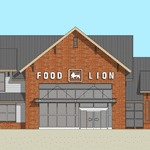Many grocery stores tout their sustainably produced foods, but at Food Lion, the building itself is the greatest green initiative. As part of Food Lion’s journey toward sustainability, it has explored environmental and energy-saving strategies for nearly a decade. The sustainable strategies selected are in the best interest of the environment and the communities they serve.
In 2009, Food Lion opened its first environmentally friendly grocery store in Columbia, South Carolina, which became its first LEED Silver-certified store. The supermarket giant opened its second and third LEED stores in April 2011, located in Fayetteville, North Carolina, and Hope Mills, North Carolina.
In Food Lion’s quest to further its commitment to operate as a responsible corporation, the food retailer’s new Williamsburg, Virginia, store was constructed with sustainable features intended to benefit the community. Energy-saving measures are expected to reduce the store’s energy consumption by at least 20 percent.
Construction of the Williamsburg Food Lion store began in February 2011. The store opened nine months later as the grocer’s fourth LEED Silver-certified location. The 35,000-square-foot store was constructed from the ground up. Benny Smith, Food Lion spokesman, says that at least 20 percent of the building materials contain a high percentage of recycled content. Other sustainable features include an energy-efficient roof and carbon dioxide sensors located throughout the store.
“Our store also features LED lighting in the frozen food cases, low-flow and sensor-activated water fixtures in the restrooms, and a unique rainwater-harvesting system that captures rainwater from the roof and reuses it for irrigation,” Smith says.
The Williamsburg store is expected to conserve water by at least 40 percent, thanks to its low-flow, sensor-operated water fixtures. The rainwater-harvesting system captures rainwater from the roof, therefore reducing the need for additional on-site water use.
Although all of the environmentally friendly construction components delivered measurable energy savings, some of the sustainable features are more apparent than others. “Our Williamsburg store features a number of energy-efficient services, including an on-site recycling center, an educational kiosk, and preferred parking for carpool vehicles,” Smith adds. For the customers and associates that spend time in the store environment, Food Lion purposely used low-toxicity interior materials. Throughout construction, low-emitting sealants, paints, woods, and adhesives were used.
The food retailer sought LEED certification for the Williamsburg location as part of its agreement with the county and because the sustainable practices are part of Food Lion’s overall strategy—protecting the environment and creating a better tomorrow for the communities it serves. “Food Lion is proud of all its LEED stores, which we feel offer extra benefits to our customers,” adds Smith.
While the LEED-certified stores are four among the approximately 1,300 Food Lion supermarkets in the Mid- and South Atlantic states as well as Tennessee and Kentucky, the food retailer remains committed to numerous sustainability initiatives such as energy conservation and reducing its carbon footprint.
“Our environmental and energy strategies are about doing what is right for our communities and the environment, but it is also the right business decision for our customers and shareholders,” Smith says. “We are always evaluating new opportunities to build energy-efficient stores.”

